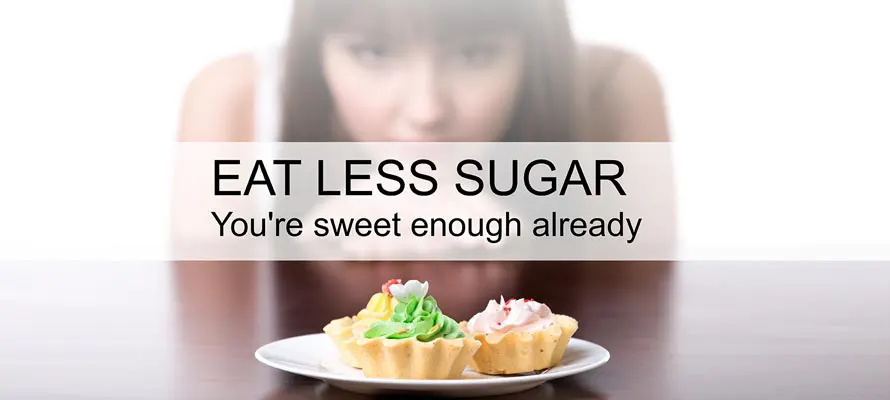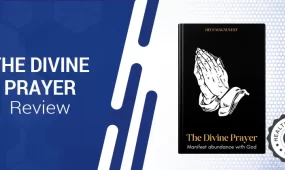With the new year, you may be wanting to lose weight. In fact, it may be your only New Year’s Resolution, or at the top of your resolutions list. Yet one of the reasons you may be struggling to lose weight is sugar cravings.
With the holiday season, you may have felt as if these cravings were out of control. From Christmas cookies to pies and cakes, sugar seems to be everywhere.
But what exactly is a craving?
Overview
Ever suddenly get a craving for sugar?
Do you crave ice-cream, cookies, or chips, pizza, or fries?
These are all sugar cravings.
If those cravings hit you hard you may have wondered, “Why am I craving sugar?” The second question you may have is, “How to stop sugar cravings instantly?”
Cravings for certain foods, including sugar, are extremely common. While these cravings are more common in women with 97% of women affected, men are hit by them as well.
You may have experienced these cravings many times. Picture it, you have just come home from a hard day of work and you have a craving for something sweet. Or, in the evening, after dinner, you crave that piece of pie and then another piece.
Does this sound familiar?
Sugar cravings can hit at any time during the day. Yet one of the most common times for such cravings is in the evening after dinner.
Here are some reasons that may apply to you as to why you are craving sugar:
- You are using artificial sweeteners
- You sleep poorly
- You are stressed
- You are eating to soothe your emotions or to feel better
- You body needs certain minerals
The above are the most common reasons why many of us, especially women crave for this.
1. Artificial Sweeteners
According to Mayoclinic, artificial sweeteners have been commonly used as an alternative to sugar for years.
The most common artificial sweeteners are:
- Sucralose (the yellow packet – brand name Splenda)
- Aspartame (the blue packet – brand name Equal)
- Saccharine (the pink packet – brand name Sweet ‘N Low)
Even if you do not use them to sweeten your coffee or in the foods you make, they are everywhere. If you use any foods that are not fresh, chances are you are eating an artificial sweetener.
Artificial sweeteners are in:
- Puddings
- Soft drinks including non-diet drinks
- Canned foods
- Dairy products like yogurt
- Pasta sauces
- Granola and other cereals
- Powdered sports drinks
- Low fat salad dressings
- Diet foods
- Frozen foods
Though these artificial sweeteners are zero calorie and may decrease the total amount of sugar you consume, they cause you to have more craving.
Since they are so much sweeter than regular sugar, they change how you taste the food. They make you want more sweetness and you, as a result, crave sugar.
Here are other ways artificial sweeteners affect you:
- Increase your craving for food
- Cause you to eat more foods with sugar the next day
- Cause you to want higher calorie and high fat foods including sugar
- Heightens sugar cravings and dependence because they are sweeter than sugar
So, if sugar cravings are affecting your weight, you may want to reconsider that artificial sweetener.
2. Poor Sleep
Lack of sleep, or sleeping poorly, is another cause of sugar cravings. When your sleep is disrupted and it causes you to sleep less than 7 hours, the hunger hormone ghrelin is increased.
Effects of poor sleep include:
- Increase in the hunger hormone ghrelin – you eat more high calories foods especially sugar, the next day
- The appetite suppressant hormone leptin is decreased
- You have after dinner cravings causing you to eat more high calorie sugar rich foods even when you have had a big dinner
- Low energy the next day so you subconsciously reach for a bagel, pastry or donut for a sugary energy boost
- You eat more food the next day
- You don’t feel satisfied, so you crave sugar
For more information on how sleepless nights affect your weight, see the article on Do Sleepless Nights Prevent us from Losing Weight?
3. Stress and Your Emotions
Stress is another cause of your sugar cravings. You do not need to feel stressed out for stress to affect you.
Even low levels of stress and relational tension whether it be with a friend, family member, partner, or co-worker can cause you to crave sugar.
According to the Study.com, Chronic stress is the stress that is long in duration such as chronic pain or recurs, again and again, such as staying late at work multiple nights. More than 40 million of us deal with chronic stress.
Stress causes you to crave sugar. Here is what happens:
- Relationship stress causes higher levels of the hunger hormone ghrelin, so you crave
- Social stress makes you eat more sugar and other high carbohydrate-rich foods
- Stress causes restless sleep and lower energy which makes you crave sugar
- Stress lowers the appetite-controlling hormone leptin leading to hunger and cravings
Stress also affects our emotions. It can cause you to feel down, angry, frustrated, and overwhelmed. Sugar cravings can be a result of your emotional state.
Even if it is not stressed that is causing you to feel sad or down, sugar does elevate your mood. It causes an immediate sense of well-being and elevates your mood when you get that sugar rush. This is emotional eating.
Signs of Emotional Eating:
- Craving and eating when you are not physically hungry
- Craving is influenced by your emotions
- Seeking sugary and other high carbohydrate foods for comfort
- Feeling guilt and shame after you give in and eat the sugar
What Deficiency Causes Sugar Cravings?
Certain deficiencies can also cause you to crave sugar. Women are especially hit with this when they crave chocolate. Chocolate is the most craved food.
One explanation for this is a deficiency in the mineral magnesium. Chocolate contains magnesium and many other vitamins and minerals such as iron and manganese.
You can have that chocolate without the guilt or affecting your weight.
How to Indulge in Chocolate without the Guilt
- Eat dark chocolate that has at least 70% cocoa as it has less sugar
- Eat only 1 ounce
- Let it melt in your mouth and savor it
NOTE: Talk to your doctor about taking a magnesium supplement.
How to Stop Sugar Cravings Instantly?
To help you jumpstart those New Year’s Resolutions here is how to end those cravings.
-
1. Lower your stress
-
2. Get better sleep
-
3. Check your foods for artificial sweeteners
-
4. Check-in with your emotions
Do deep breathing exercises. Take a deep breath in, hold if for five seconds, and slowly let it out. Do this as many times as needed. Mediate or listen to some calming music. You can also journal as a way to get out of your head and lower your stress.
Sleep in the dark. Use blackout curtains or a sleep mask. See more tips on how you can sleep better in this article.
Cut back on the amount you use. Check the ingredients labels on the foods in your cabinets for artificial sweeteners so you know how much you are consuming.
Switch to stevia or erythritol as they have not been shown to cause such cravings.
Are you hungry for sugary foods due to physical hunger or to elevate your mood? What is the emotion behind the craving?
Find healthier alternatives such as going for a walk, talking to a friend, or writing in a journal.
How to stop sugar cravings in the evening
- Go for a short walk – get away from the temptation
- Eat more protein at dinner – protein fills you up and satisfies so it cuts those cravings
- Stay away from diet sodas at dinner as they contain artificial sweeteners causing cravings
As you have read, such cravings are not all in your head. They are real and they have real causes.
Learning what causes sugar cravings is just the start. When you start to implement strategies to end your cravings you will be able to jumpstart your New Year’s Resolutions.
Sources
Health Insiders relies on peer-reviewed studies, academic research institutions, and medical associations. We avoid using tertiary references. You can learn more about how we ensure our content is accurate and current by reading our editorial policy.
[1] Bartolotto C. Does Consuming Sugar and Artificial Sweeteners Change Taste Preferences?. Perm J. 2015;19(3):81-84. doi:10.7812/TPP/14-229
[2] Fowler, S.P., Williams, K., Resendez, R.G., Hunt, K.J., Hazuda, H.P., & Stern, M.P. (2012). Fueling the obesity epidemic? Artificially sweetened beverage use and long-term weight gain. Obesity, 16(8), 1894-1900. doi:10.1038/oby.2008.284
[3] Chao AM, Jastreboff AM, White MA, Grilo CM, Sinha R. Stress, cortisol, and other appetite-related hormones: Prospective prediction of 6-month changes in food cravings and weight. Obesity (Silver Spring). 2017 Apr;25(4):713-720. doi: 10.1002/oby.21790. PMID: 28349668; PMCID: PMC5373497.
[4] Gardner, M. P., Wansink, B., Kim, J., & Park, S. (2014). Better moods for better eating?: How mood influences food choice. Journal of Consumer Psychology, 24(3), 320-335. doi:10.1016/j.jcps.2014.01.002 https://psycnet.apa.org/record/2014-27562-003
[5] Jaremkaa, L.M., Beluryb, M.A., Andridgec, R.R., Malarkeyade, W.B., Glaseraef, R., Christianaghi, L., Emeryadg, C. F., & Kiecolt-Glaseraegh, J.K. (2014). Interpersonal stressors predict ghrelin and leptin levels in women. Psychoneuroendocrinology, 48, 178-188. doi:10.1016/j.psyneuen.2014.06.018
[6] Knutson, K.L. & Van Cauter, E. (2008). Associations between sleep loss and increased risk of obesity and diabetes. Annals of the New York Academy of Sciences, 1129, 287-304. doi:10.1196/annals.1417.033.
[7] Lavin JH, French SJ, Read NW. The effect of sucrose- and aspartame-sweetened drinks on energy intake, hunger and food choice of female, moderately restrained eaters. Int J Obes Relat Metab Disord. 1997 Jan;21(1):37-42. doi: 10.1038/sj.ijo.0800360. PMID: 9023599.
[8] Markwald RR, Melanson EL, Smith MR, Higgins J, Perreault L, Eckel RH, Wright KP Jr. Impact of insufficient sleep on total daily energy expenditure, food intake, and weight gain. Proc Natl Acad Sci U S A. 2013 Apr 2;110(14):5695-700. doi: 10.1073/pnas.1216951110. Epub 2013 Mar 11. PMID: 23479616; PMCID: PMC3619301
[9] White M.A., Whisenhunt B.L., Williamson D.A., Greenway F.L., & Niemeyer R.G. (2002). Development and validation of the Food-Craving Inventory. Obesity Research, 10, 107-114. doi:10.1038/oby.2002.17
[10] Yang Q. Gain weight by "going diet?" Artificial sweeteners and the neurobiology of sugar cravings: Neuroscience 2010. Yale J Biol Med. 2010 Jun;83(2):101-8. PMID: 20589192; PMCID: PMC2892765.
[11] Susan Yanovski, Sugar and Fat: Cravings and Aversions, The Journal of Nutrition, Volume 133, Issue 3, March 2003, Pages 835S–837S
[12] Yau, Y. H., & Potenza, M. N. (2013). Stress and eating behaviors. Minerva Endocrinologica, 38(3), 255-67.







 This article changed my life!
This article changed my life!
 This article was informative.
This article was informative.
 I have a medical question.
I have a medical question.
 Ask a Question
Ask a Question

 This article contains incorrect information.
This article contains incorrect information.
 This article doesn’t have the information I’m looking for.
This article doesn’t have the information I’m looking for.